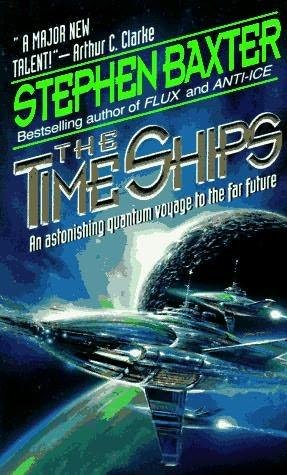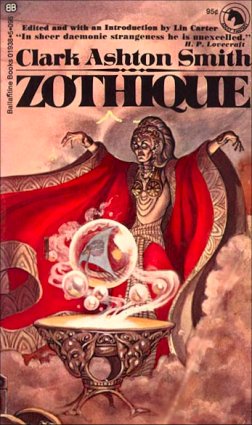

|
An End of Days
|
|
SF authors Isaac Asimov and Pamela Sargent (among others) describe science fiction as a literature of ideas. But the ideas of science fiction are necessarily preceded by questions: The classic starting point for an SF story is a simple "What if?" Indeed, it can be argued that science fiction is to human culture what Einstein's gedanken experiments were to physics - "thought" experiments designed to provide theoretical insight to questions that would otherwise be difficult or impossible to answer. |

|
There are certain fundamental questions that SF routinely tackles, many of them related to understanding ourselves as individuals and as a species. The alien is used as a plot device to guide the reader to a better understanding of what it means to be human. The question of humanity and identity is explored in stories that posit machine-based intelligence or the copying of an individual - can an artificial intelligence ever be said to be "alive," and if a teleport machine accidentally creates two exact copies of me then which one is "real"?
Another way to approach an understanding of ourselves is to speculate on origins, in that knowledge of when and how we as a species became human could tell us much about what it is to be human. And finally, a natural counterpoint to stories of origin are stories of ending: What is our destiny as a species, and how will we end?
This last group of questions belongs to a branch of thought called eschatology, which concerns itself with the ultimate ends or destiny of humanity, the world, and existence - usually from a theological or philosophical point of view. This could be said to include SF sub-genres such as disaster and holocaust (nuclear, ecological, plague, etc), which is the equivalent of saying that we as a species are prone to or at least susceptible to sudden, violent and potentially imminent destruction. But the abrupt death of a person, be it accident or murder, though it might possibly say something about how they lived, cannot speak to who they would have become. Eschatology, particularly from a religious viewpoint, presupposes some sense of purpose to existence - that events don't just happen at random until the clock runs down and things stop.
Eschatological science fiction may or may not contain elements of purpose associated with the ultimate destiny of humankind.
The idea that species in general (and the human species in particular) have an origin and ultimately an ending that is not dependent on divine intervention is a relatively new one in the history of human thought. Traditional Christian theology, simply to pick the one I am most familiar with, ties the origin to a divine creation in which all species were brought into being and the ending to a time of apocalypse in which the world as a whole ends. Darwin's evolution revolution opened up immense vistas of time and hinted at literally uncounted numbers of species that lived and died out prior to humans. It also led to the logical conclusion that as a biological species we have no reason to expect to be around forever. Various concepts of evolutionary thought have been applied in an SF context, yielding stories in which humanity evolves into one or more new species or is supplanted by another "superior" species. Both of these scenarios implicitly acknowledge that the end of humanity is not the same as the end of existence. It is a somewhat humbling thought and relates directly to our own sense of personal mortality.
In this month's column I will examine a type of eschatological science fiction in which humanity has lived on in one form or another, typically into a far future, and is perhaps poised on the verge of extinction - death by old age, as it were. These are commonly referred to as stories of the Dying Earth.
Please note: In suggesting resale values for specific titles (particularly recent publications), I am usually assuming Near Fine to Fine condition. If not stated otherwise, books discussed are hardback first printings. Titles, series, and publishers of particular note to the collector and the bookseller alike are indicated in bold.
..."My name is Ozymandias, king of kings:
Look on my works, ye mighty, and despair!"
Nothing beside remains: round the decay
Of that colossal wreck, boundless and bare,
The lone and level sands stretch far away.
Ozymandias, Percy Bysshe Shelley 1818
Shelley's sonnet, while it references the iconography of ancient Egypt, captures perfectly the imagery and mood usually associated with tales of the far future dying Earth. Themes of ruin, senescence, stagnation, melancholy and decay abound, as do ennui, degeneration and devolution. Science and technology are sometimes absent, although high-tech artifacts can survive. The line between science fiction and fantasy (and even horror) is particularly blurry here. Magic and technology sometimes co-exist and indeed may be difficult to distinguish.
One classic early title associated with this theme is HG Wells's The Time Machine, in which by the year A.D. 802,701 the human race has diverged into two sub-human branches: the bestial Morlocks and the child-like Eloi. After many dangers, the Time Traveler ventures millions upon millions of years into the future, observing the Sun flare and dim repeatedly, and ultimately ending in a silent, nearly barren and snow-covered world. Stephen Baxter was authorized by the Wells' estate to write a sequel: The Time Ships (London: Harper Collins, 1995; hardback 1st, $250 to $350).

Clark Ashton Smith was a poet, artist, and author of numerous fantasy, horror and science fiction short stories. He was influenced by Edgar Allan Poe and was a contemporary of H. P. Lovecraft and Robert E. Howard. Smith's longest cycle of stories is set on the far future continent of Zothique, which he described in this 1953 letter to L. Sprague de Camp:
"Zothique, vaguely suggested by Theosophic theories about past and future continents, is the last inhabited continent of earth. The continents of our present cycle have sunken, perhaps several times. Some have remained submerged; others have re-risen, partially, and re-arranged themselves.... The science and machinery of our present civilization have long been forgotten, together with our present religions. But many gods are worshipped; and sorcery and demonism prevail again as in ancient days."

Smith's Zothique stories have been collected and reprinted numerous times, as have his other stories, notably those that share in Lovecraft's Cthulhu Mythos. Look especially for any Clark Ashton Smith titles from Arkham House. To give some perspective, a recent reprint of A Rendezvous in Averoigne (Sauk City: Arkham House Pub, 2003; ISBN: 0870541560) lists on Abebooks at $30 and up - and this is the least expensive of Smith's Arkham House titles. Smith also had four titles in the Ballantine Adult Fantasy paperback series from the early 1970s: Zothique, Hyperborea, Xiccarph, and Poseidonis. Assuming Very Good to Fine condition, any of these titles should sell for a minimum of $10 to $20 - as a lot, they should do quite well with a sale price of $50 or more.
>>>>>Click here for page two>>>>
Questions or comments?
| Forum
| Store
| Publications
| BookLinks
| BookSearch
| BookTopics
| Archives
| Advertise
| AboutUs
| ContactUs
| Search Site
| Site Map
| Google Site Map
Store - Specials
| BookHunt
| BookShelf
| Gold Edition & BookThink's Quarterly Market Report
| DomainsForSale
| BookThinker newsletter - free
Copyright 2003-2011 by BookThink LLC
Contact the editor, Craig Stark
editor@bookthink.com

|